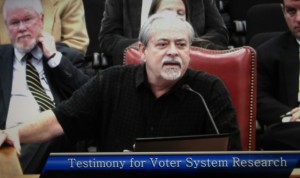SC Progressive Network Director Brett Bursey addressed the Joint Legislative Committee on Voting System Research on Nov. 10 at a meeting to talk about replacing the state’s aging voting machines. (His testimony begins at 2:13 in this clip.)
The five Senators and five House members on the committee invited State Election Commission Director Marci Andino to make a presentation about the acquisition of new voting machines. She was hired in 2003, not long before she spent the state’s $34 million federal grant to buy new voting machines. Ours was the first state to spend its Help America Vote Act (HAVA) money that was allocated after the 2000 “hanging chad” drama that resulted in the George Bush presidency.
In 2003, the Network testified before the SEC board (Andino’s bosses) while its members deliberated whether to buy more than 10,000 of the machines at $3,000 apiece. We presented expert witnesses who testified that the proposed machines were not certified by the federal Election Assistance Commission, that the software to run them is secret, and the devices don’t produce a voter-verifiable paper record necessary for a recount.
Against that advice, South Carolina bought the machines, and Andino remains a loyal consumer of the paperless, secret-software, touch-screen devices we have been using since 2004.
Andino told the committee that she was going ahead with writing the Request for Proposals for the new voting system, and expected to have the bid let by the end of the year. Committee Chair Sen. Ronnie Cromer (R-Lexington) pointed out that the committee wouldn’t have their report on what kind of system SC should buy until after the first of the year.
Andino told the committee that the state procurement code put her in charge of writing specifications for investing $40 million in a new voting system. Murmurs in the audience suggested that she might regret telling legislators that they couldn’t tell her what to do.
Comments from legislators – especially the Republicans – supported the type of system that the Network has for years been advocating: a publicly owned system that doesn’t rely on secret codes for security, but relies on a voter-verified paper ballot. It is a simple system that can use an off-the-shelf computer or tablet to run software that lets the voter touch (or talk) to the screen and print a paper ballot. The voter reviews the ballot to verify that it’s marked correctly, then deposits the ballot in a scanner that counts the vote before the voter leaves the precinct.
This low-tech system will cost about half of what Andino is prepared to spend on a proprietary one, and it doesn’t require specially trained company technicians. The state could teach students in our 17 tech schools to maintain our publicly owned system.
The Network will be educating the public and our members on this issue, and asking them to lobby their legislators to purchase a more transparent, reliable and fiscally sound voting system.

